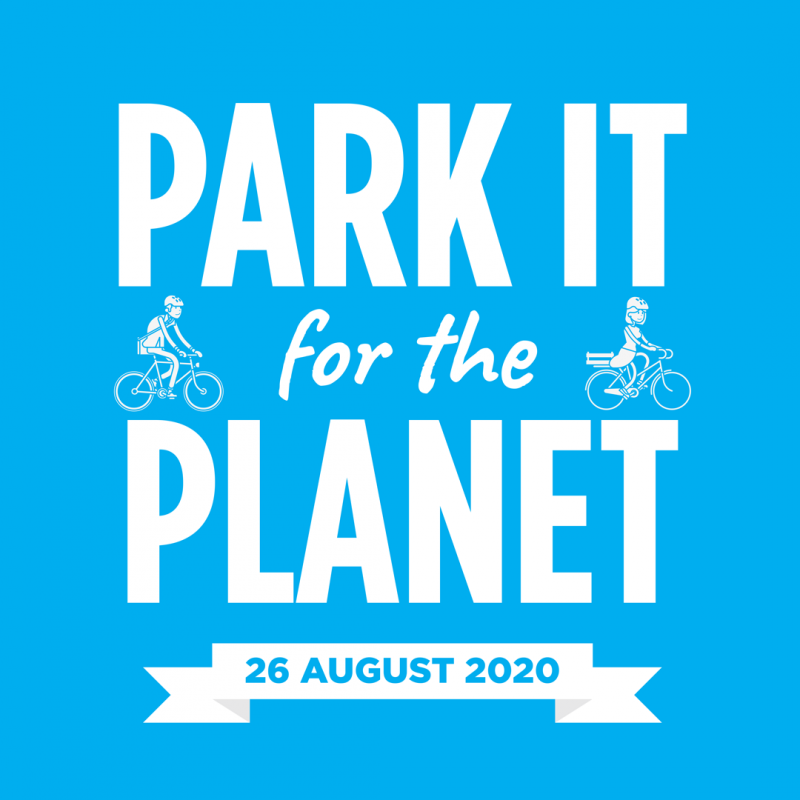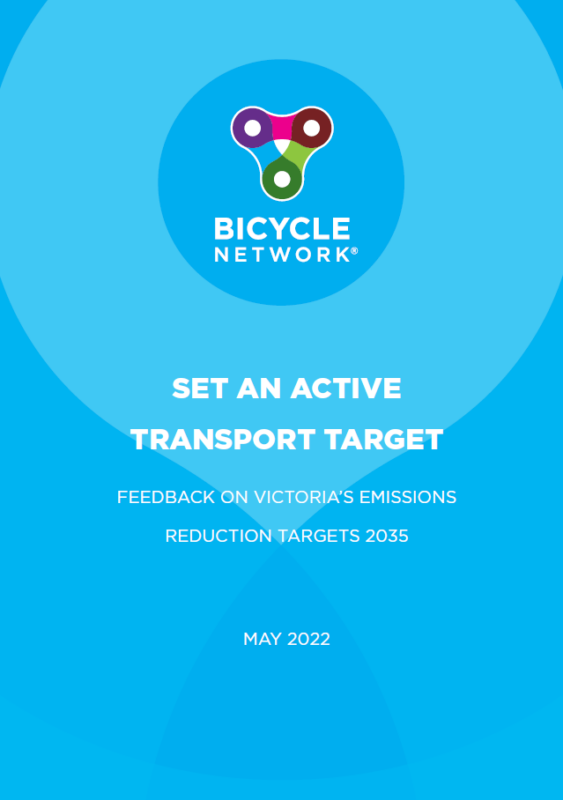The problem
Our planet is undergoing climate change, and transport is one of Australia’s biggest contributors to carbon emissions.
In August 2021, the Intergovernmental Panel on Climate Change (IPCC) released its Sixth Assessment Report, which found that global warming is advancing more quickly than expected.
In Australia, this means we are likely to have hotter and drier weather, more regular droughts and harsher bushfire weather. We’ll also have more intense and extreme rainfall events, severe thunderstorms and increased flooding from rising sea levels1.
The transport system was responsible for more than 17.6 per cent of Australia’s greenhouse gas emissions in 2020, our third largest source of emissions2. And bear in mind that many Australians were in lockdown throughout the year.
There is a lot of room for improvement here. Australia has one of the worst records for transport-related emissions, ranking in the bottom 20 per cent on the International Energy Efficiency Scorecard3.
Every time we jump in a car we’re contributing to climate change, which is bad news.
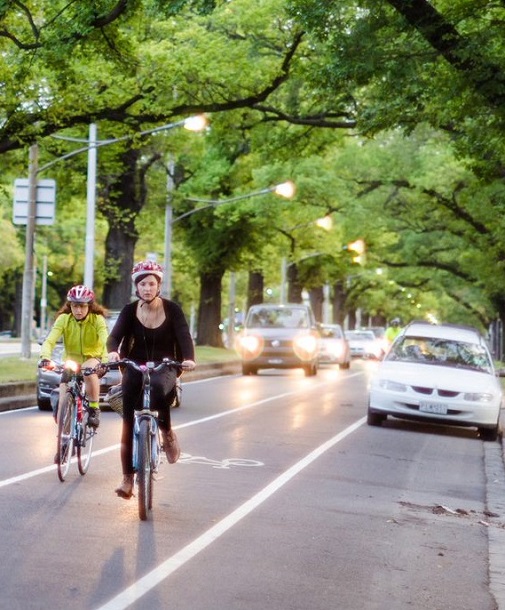
The solution
1. Start riding a bike
It’s that simple. By opting for bikes, we can reduce the greenhouse gas emissions from the transport system, which will slow the effects of climate change and reduce the risk of extreme and unpredictable weather.
Bike riding is incredibly popular – 10 million Australians ride every year – but only 200,000 ride to work.
If we all jump on our bikes when we need to get around, we could make a massive contribution to saving our planet.
There is clear evidence that bike travel results in drastically lower greenhouse gas emissions4.
Swapping car trips for bike trips is a simple, convenient and proven way of reducing our transport emissions, and each of us can start doing this straight away.
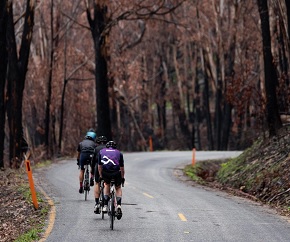
2. Push for stronger bike policy
We know that riding a bike can have a huge effect on climate change, but we can’t do it all on our own. Better state and national policies for bikes will help boost our capability to address climate change.
Our actions in addressing climate change can take two forms: mitigation, the proactive steps required to reduce transport-related emissions; and adaptation, the action we take to build our resilience to climate risks.
Here are some examples of bike policies that could assist in preventing or stabilising climate effects and keep bike riding a safe transport option as we adapt to climate change.
Mitigation
If we want people out riding bikes, we need to provide a safe and comfortable experience. This means separated and well-connected bike networks, where riders are protected from other road users.
We must set strong targets for increasing bike uptake and work towards achieving them. This is already starting to take shape across many capital cities.
Vehicles sold in Australia must conform to national design standards. We must work towards harmonising our standards with those of the United Nations, to ensure we are manufacturing lower emission vehicles.
Adaptation
Strong mapping and risk assessment frameworks will be critical for identifying the climate risks in vulnerable areas, such as coastal zones, forests, and areas with low soil moisture.
Our drainage infrastructure underneath roads and paths must have the capacity for dealing with intense rainfall events and flashing flooding. Coastal infrastructure should be sufficiently elevated to protect against flooding and sea level rise.
Urban greenery, green roofs and shading provide shelter and reduce heat exposure during drought and extreme heat events, whilst also soaking up some of our carbon emissions. Policy can guide increased ‘greening’ and prioritising walking and riding corridors through existing parks and reserves.
How Bicycle Network is getting involved
Park It for the Planet
There are plenty of trips that can be made on a bike – whether it’s to work, school, the shops or even the local pub for a Friday night meal.
People who don’t ride very often can start by aiming to ride to work one day a week. Maybe you’re a regular cyclist who heads out to the hills every weekend but don’t use a bike for everyday transport. You could try riding to the shops when you run out of bread or going to school with the kids on a bike.
On Wednesday 26 August 2020 we decided to #parkitfortheplanet and asked Australians to pledge to swap one car trip for a bike ride. Park it for the Planet was inspired by ABC’s Fight for Planet A series.
Government submissions
Bicycle Network prepares submissions to ensure that bikes are recognised in our state and national strategies for preventing and adapting to climate change.
Our most recent submission was made to the Victorian Government regarding the state’s Emission Reduction Targets and the need to consider increasing active transport as a transport mode.
We have also made submissions to Victoria’s Climate Change Adaptation Action Plan and the Tasmanian Climate Action Plan to guide the formation of a new 2021–26 plan.
We will continue to engage with governments to ensure climate change strategies and plans consider the needs of people riding bikes.
Bike riding and climate change
In the news...
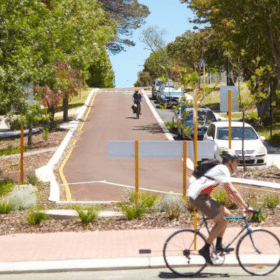
Climate Council urges Australians to triple bike riding and walking
Many solutions to climate change carry remains far off in the distance with lots of unanswered questions, but the good news is we have tools...
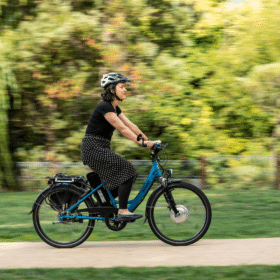
Australia’s EV strategy misses the turnoff for faster climate action
The Australian government has released its first National Electric Vehicle Strategy, a roadmap to tackle emissions in the transport sector by promoting a shift toward...
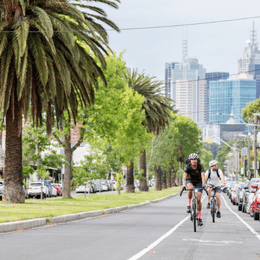
Climate Council releases state transport emissions scorecard
Which state is leading the charge with reducing their transport-related emissions? A new report from the Climate Council tells all.

Canberra Electric Bike Library extended
More Canberrans will be able to access electric bikes, with a library service for e-bikes extended for another two years.
Useful resources
Here are some handy resources if you’d like a hand to start riding, learn more about climate change or do more to reduce your carbon emissions.
Start riding
Bicycle Network has some tips for people of all ages and ability to help you choose a bike and gear, plan a route and prepare for your ride.
Start ridingClimate Council
The Climate Council is Australia’s leading climate change communications organisation, providing expert advice to the Australian public on climate change and solutions.
Read moreOne Small Step
One Small Step is a mobile app with tailored programs to help you cut your carbon footprint using behavioural science to make green living simple, easy and fun.
Download appC40.org
C40 is an excellent resource for actions cities can take for meaningful, measurable and sustainable action on climate change.
VISIT SITEClimate Action Tracker
The Australian Government’s Climate Action Tracker breaks down our current actions to climate change and measures how we are weighing up internationally.
VISIT SITEIPCC Reports
If you’re ready for a deep dive, check out the IPCC Reports, which detail the current knowledge on climate change effects.
VISIT SITEReferences
- “How will climate change affect Australia?’, Climate Council
- National Greenhouse Gas Inventory Quarterly Update: December 2020
- ‘The 2018 International Energy Efficiency Scorecard’, American Council for an Energy Efficient Economy
- ‘The climate change mitigation effects of daily active travel in cities’, Transportation Research Part D: Transport and Environment
What else does Bicycle Network do?
Bicycle Network takes a responsible approach to the things we do and makes sure we are as green as possible.
As well as making it easy for all team members to ride a bike every day we minimise our vehicle use, have a reduce, reuse, recycle policy and keep energy use down at our offices with light timers.
People who have been on our events including the Great Vic Bike Ride and Peaks Challenge Falls Creek will also have noticed our phase out of unnecessary single use and disposable products.
Become our friend
Find out more about Bicycle Network and support us in making it easier for people to ride bikes.


